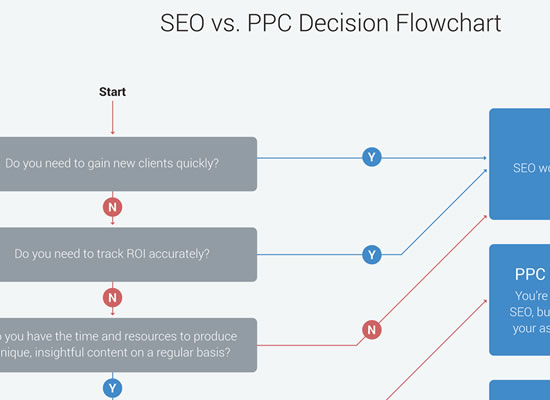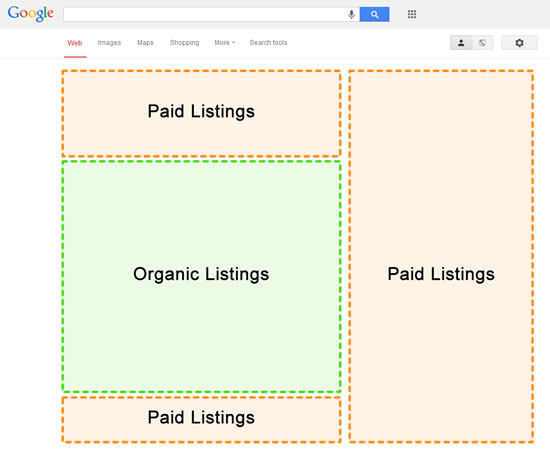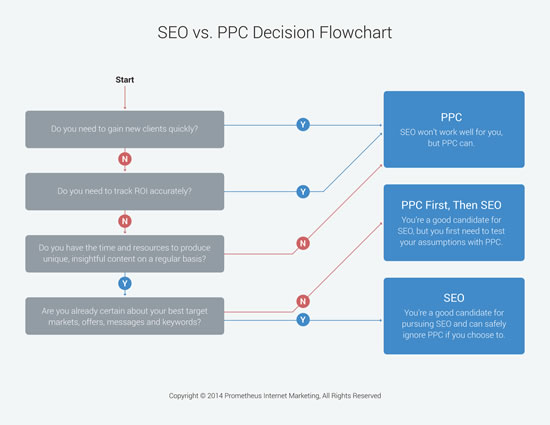SEO vs. PPC: Which is Best for Your Business? (Handy Flowchart)
Do you want your business website to show up in Google search results? Then you’ve probably struggled with how to best achieve that – with SEO, PPC, or a mix of both?
And you’ve likely spent time reading various opinions online, only to come away even more confused.
In this post I’ll help you determine the right answer for your business objectives. And I’ve included a handy downloadable flowchart at the end of the post to make it even easier.

The Choices
First, a little background.
SEO (search engine optimization) helps your website pages show in the free “organic listings” section of the search results page.
PPC (pay-per-click advertising) helps your website pages show in the paid ad section of the search results page.
Here is how the two types of website listings display on Google search results pages:

To fully appreciate the rest of this post, you might want to take a brief detour to better understand the world of SEO and PPC today:
- How AdWords Became Critical for Your Business in 2013
- 3 Big Reasons to Love GAW
- 3 Big Reasons to Hate GAW
- Why Google is the Best Source of Clients for Your Service Business
The Problem
You want good prospects to come to your website and become good clients. But you don’t know your best path to success between SEO and PPC.
SEO feels like the Holy Grail. If it works, you get loads of targeted prospects visiting your website every month for free. If it works.
And SEO used to be easy. Just stuff good keywords on your website pages, then buy, beg or steal backlinks, and you’re on your way. But Google has put an end to that nonsense.
So you can’t manipulate your SEO results any more. Yet you feel like your website content deserves to be more prominent than your competitors’. And you don’t like the idea of paying for each prospect who visits your site.
But is that feeling rational for your business?
Can SEO really be profitable for you and help you meet your business objectives, or could PPC actually be the better path?
The Solution
First, you have one other consideration if you serve clients locally:
Is your business local?
If your business serves local clients, then stop reading right now and go do “local SEO” for your website. (here’s a helpful link for local SEO)
You need to show up in local search results if people include your city or region in their search terms or if they are physically near you when they search. And the process is straightforward.
Once you’re done with that, come back here to determine your next step.
The rest of this post is relevant for you whether you focus on clients locally, nationally, or internationally.
Here is a summary of the benefits and drawbacks of SEO and PPC to help you make an informed decision.
The Benefits of SEO
- You get free ongoing traffic to your website (if successful).
- It forces you to regularly produce unique, insightful and helpful content. This helps build your company’s authority and deepen relationships with prospects, making it easier to win new clients.
The Drawbacks of SEO:
- You never know when Google will unilaterally change the game again. At Google’s whim, your free organic traffic can disappear overnight and never return. Many companies have found this out the hard way in the past 3 years.
- Google continues to reduce the real estate available to business websites in the free organic search listings. This means that even if you flawlessly execute an SEO plan, your ultimate traffic results may not be as good as in the past. All that for nothing!
- You can only reach prospects who search for the limited number of keywords and themes that you include in your content.
- It can take a relatively long time (9-12+ months) to yield significant traffic results.
- It’s hard for your website to rank highly for “good keywords” – those with both high search volume and high relevance for your business.
- Sustainable results require substantial ongoing investment of your time or your employees’ time. You must keep producing fresh content because both content value and link value decay with time.
- It’s hard to accurately measure ROI (return on investment).
- It’s hard to test your marketing assumptions. You optimize a single page for a single keyword theme and then hope that the naturally earned inbound links and social shares match it. But you won’t find out for months (or years!) later. If you were wrong? Start all over.
The Benefits of PPC
- You can get immediate prospect traffic to your website.
- You can target those prospects as narrowly as you want to maximize ROI.
- You can target those prospects as broadly as you want to expand your reach.
- You can easily measure your ROI (return on investment).
- You can easily test all your assumptions – your ideal markets, your best offers, your most engaging copy, your most focused target keywords. You can thereby improve your conversion rates (the % of site visitors who end up engaging with you) as quickly as possible.
The Drawbacks of PPC
- You pay for each new site visitor. If you stop paying, you stop getting new visitors.
- You need to master PPC management platforms (like Google AdWords).
Even if you decide to pursue SEO, you should first do PPC to test your assumptions and refine your targeting. This is how you ensure that your substantial long-term SEO investments of time and money have the best chance of paying off.
Hopefully this summary of benefits and drawbacks wasn’t too hard to digest. But to make it even easier, here’s a handy, simplified “Decision Chart”:
Click here to download the SEO vs. PPC Decision Flowchart
Summary
You need to understand your options for attracting search engine traffic, along with the benefits and drawbacks. Use the guidance in this post to determine the best option for your unique business objectives.
And remember, the key to all successful marketing, including PPC and SEO, is focus. (See “Stop Being a Wandering Generality. It’s Time to Go Niche.“)
Need help evaluating which approach is best for your business? Need help planning and implementing your optimal PPC or SEO campaigns? Request a complimentary assessment focused on your unique business model and goals.


Using flowchart for explaining is awesome. It says a lot than 1000 words. I think organic traffic from SEO is better than doing PPC. What are your thoughts
You have to test to see which traffic sources are “better”. Part of that is defining “better”, which usually means completing certain actions on your site, but not always.
For my site, for example, I’m fortunate to get far more organic traffic than paid traffic. But the paid traffic converts at a much higher rate, likely because they are better-targeted prospects.
Great summary!
Thank you, Pete!
Thank you very much for a great and interesting article. I believe that each has its drawbacks. In SEO lately there are many changes and SEO does not guarantee the outcome. PPC is still paid advertising, and click on your links is not always productive.
I agree on both points. I still prefer PPC because at least you can readily measure how productive it is (ROI), and then decide whether it makes sense to continue.